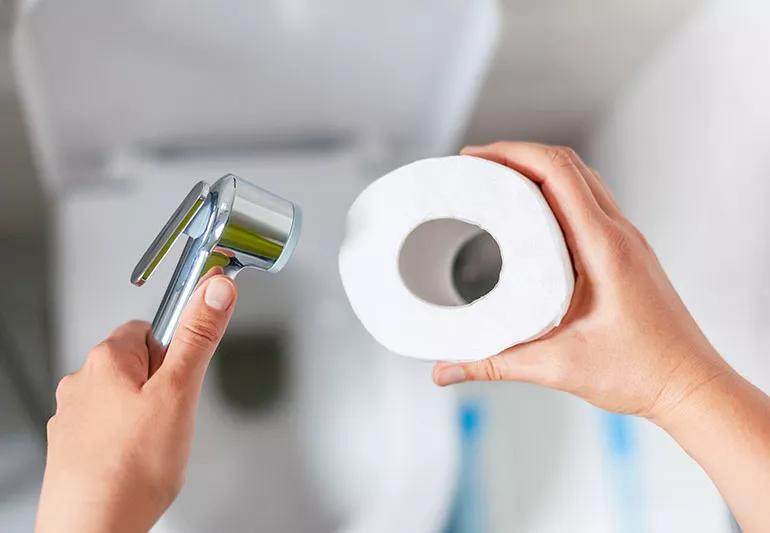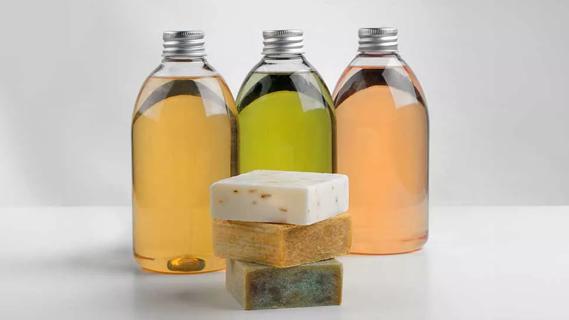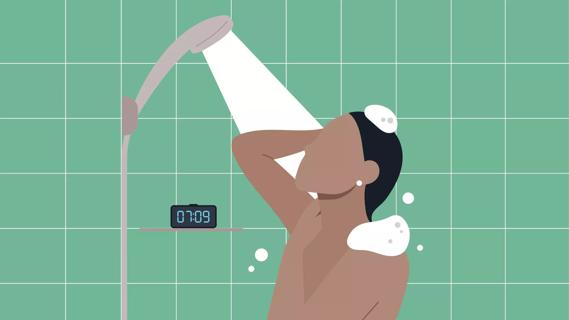The benefits of a bidet may convince you to say goodbye to toilet paper

It’s safe to say that pooping can be … well, a bit messy at times. Wiping with dry toilet paper in an attempt to clean unseen areas can be an exercise in frustration. There has to be a better way, right?
Advertisement
Cleveland Clinic is a non-profit academic medical center. Advertising on our site helps support our mission. We do not endorse non-Cleveland Clinic products or services. Policy
Allow us to introduce you to the bidet, a power washer for your bottom. Gastroenterologist Christine Lee, MD, explains how this bathroom apparatus can get the job done.
A bidet (pronounced “bih-DAY”) is a plumbing fixture designed to clean your rear. It goes to work washing your lower region after you urinate or have a bowel movement, eliminating the need for toilet paper.
Some bidets attach to your toilet, either affixed to the side of the bowl or with a detachable hose. Other bidets are standalone fixtures that resemble a low sink.
Bidets are commonplace in many areas of the world — including nations in Asia, Europe and South America, as well as northern Africa — and appear to be gaining popularity in the United States.
Bidets can arguably be considered more sanitary than traditional bottom-cleaning methods.
Quite simply, a bidet can provide a better hygiene experience compared to toilet paper. It starts with the basic fact that water can top a few squares of dry TP in removing trace amounts of fecal matter after you poop.
Wiping with toilet paper also poses a potential risk of getting fecal matter on your hands or nails: “Proper handwashing hygiene is necessary to avoid the spread of germs — and that’s especially true after wiping,” says Dr. Lee.
Advertisement
(On a side note, scrub your hands with soap and water for 30 seconds even if you use a bidet. It’s just proper hygiene when using the restroom.)
Correct usage of a bidet is important to avoid vaginal or urinary tract infections from bacteria such as E. coli. And safely using a bidet comes down to one main issue: how the water flows.
“The water from your bidet should flow front to back, just like wiping from front to back,” notes Dr. Lee.
It’s also important to have the proper water pressure and angle of the water stream to avoid forcing water into the vagina.
“A bidet is meant to clean the outside of your body, not the inside,” he adds.
A “cleaner” cleaning process is the main benefit of a bidet, but it offers other advantages, too. The wide-ranging list includes:
Read your bidet manual and follow the directions on proper cleaning and maintaining it.
“Proper operation is important,” states Dr. Lee. “If the water heater malfunctions, the water could deliver scalding hot or shockingly cold water.”
And don’t assume that it’s OK for the bidet to get dirty because it’s only cleaning your butt. If your bidet gets contaminated, those germs can find a way into the urinary tract, vagina or cracks in your skin.
“If bacteria or virus particles get into the water tank or on the nozzle, everyone who uses it can be exposed,” warns Dr. Lee. “Don’t touch the tip of the nozzle to your body and follow the manufacturer’s manual. Keeping the bidet clean and properly maintained is key.”
Based on the limited research regarding bidets, it’s generally considered safe and effective as a hygiene aid. It’s important to follow usage instructions, though, particularly with jet stream pressure and water temperature.
“But if it’s working properly and you clean and sanitize it regularly, a bidet is a good alternative option for many people,” says Dr. Lee.
Advertisement
Learn more about our editorial process.
Advertisement

Bathing once a day is the general guidance, but you could also have reasons to soap up twice a day or not at all

You’re sharing your sheets with dust mites, bacteria and lots of dead skin, so you’ll want to keep your bedding fresh

You may notice itching, redness and swelling after wearing or using laundered items

We don’t fully understand how cleanliness impacts immune system development, but we do know that preventing illness is important

How often you lather up your locks can depend on various factors, like hair type, age and ethnicity

An icy blast may boost mental clarity, increase circulation and give your skin a little glow — but don’t overdo it

This olive oil-based soap is generally mild and safe when diluted

It’s a wash — when you bathe is a personal preference

The tropical fruit is a good source of antioxidants and vitamin C

Most people fall asleep within 10 to 20 minutes, but if your experience is different, adjusting your sleep schedule may help

Exploring your hidden side can lead to better understanding of what makes you tick